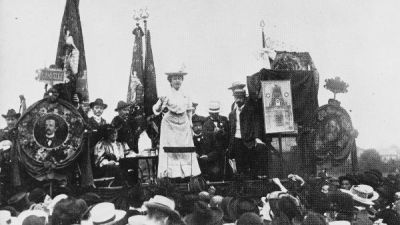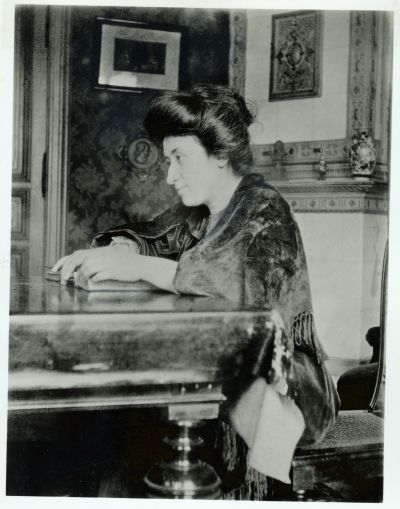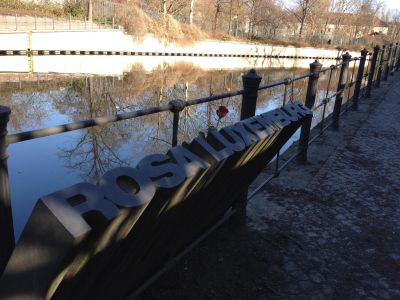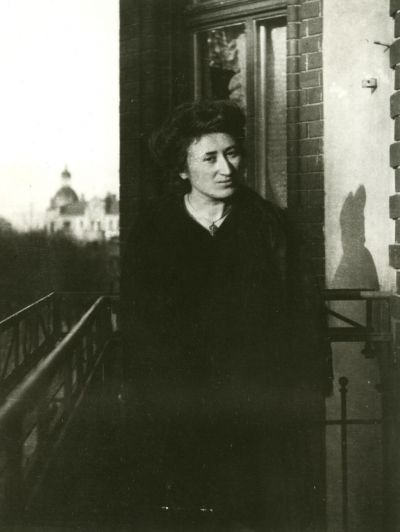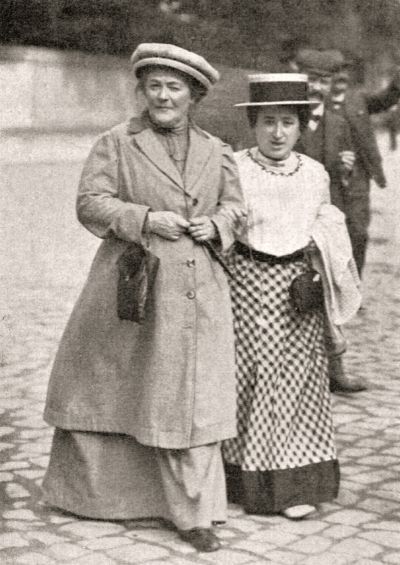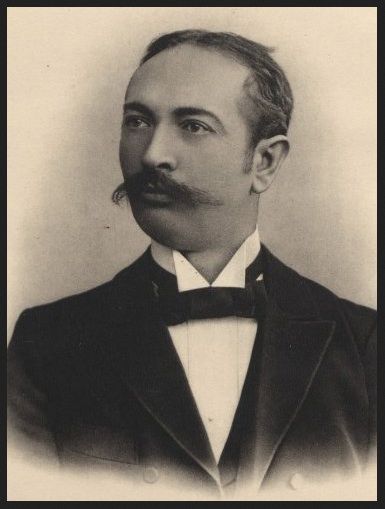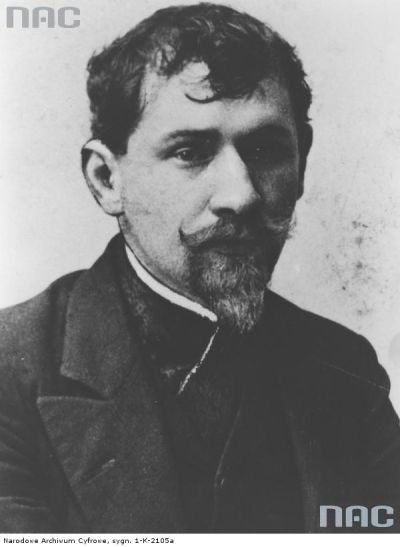Rosa Luxemburg
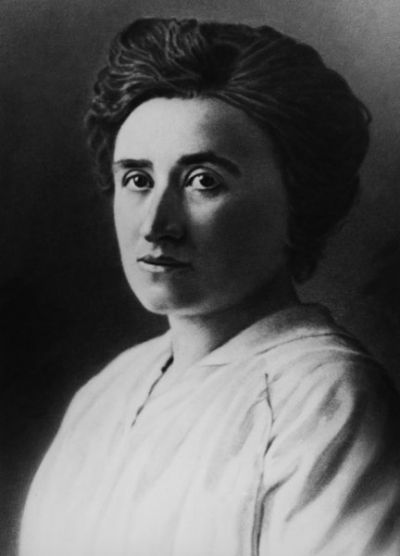
On 31st May 1919 a body was fished out of the Landwehrkanal in Berlin. It was quickly clear that it was the missing Rosa Luxemburg. It was also clear that she had been murdered: and that the motive was political. All her life Rosa Luxemburg* fought for the rights of the international working class. Rosa’s parents were Jews who were socially, politically and culturally active in Zamość. Their priority was to give their five children a good education. As a child Rosa enjoyed a humanistic upbringing. Alongside Polish and Deutsch, the two languages that were spoken at home, she learned Russian, Latin and Ancient Greek: she also had a smattering of French, English and Italian. She was interested in nature study, biology and botany, could draw well, loved listening to music, as well as learning and reciting poems.
Her political commitment was clear at an early age; and also her political leanings. At the age of 13 she wrote a sarcastic poem in Polish about Kaiser Wilhelm II, who visited Warsaw at the time. During her school time in the 2nd Warsaw Girls’ Grammar School Rosa Luxemburg belonged to a secret group of students. Here she also came into contact with a working group called “Proletariat”, an illegal political circle. In 1887, at the age of sixteen, Rosa Luxemburg ended her studies at the Warsaw grammar school with top grades in all courses. Nonetheless she was not awarded her school’s gold medal because of her “oppositional attitudes”. When the Czarist police learned that she was a member of “Proletariat” she was forced to flee to Zurich. Here she studied philosophy, economics and law. In 1897 she concluded her studies with a dissertation on the “Industrial Development of Poland”, in which she was highly praised for her huge amount of knowledge and her brilliant style. Only a year later the work was published by Duncker & Humblot in Leipzig in 1898.
In 1893 her political vision began to take on clear contours. She founded a newspaper for exiles in Paris, “Sprawa Robotnicza” (Workers’ Affairs). A short time later she co-founded the internationally outward-going “Social Democratic Workers’ Party of the Kingdom of Poland” and in 1900 the “Social Democratic Workers’ Party of the Kingdom of Poland and Lithuania”. In 1897 Rosa Luxemburg decided to move to Germany. In order to become a German citizen she married Gustav Lübeck, the only son of her host family in Zurich, on 19th April 1898. In 1898 she joined the Social Democratic Party of Germany (SPD) which was regarded in the working class movement as the most progressive socialist party in Europe. She rapidly gained a high reputation in the SPD as a specialist on Polish affairs. In Dresden she took over the editorship of the “Saxon Workers’ Paper” before moving to Berlin where she was paid to write anonymous articles for a variety of SPD journals. All this time she continued to work in a highly committed political manner. Early on she warned of a coming war. In 1903 she criticised Kaiser Wilhelm II once more, this time in public, when she said “The man who speaks of the fine secure existence of German workers has no idea of the facts.” She was then sentenced to three months in jail for lèse-majesté. In 1906 she was sentenced once again for “provoking class hatred”.
In 1907 she attended the party conference of the Russian social democrats in London, and the congress of the “Second International” in Stuttgart. In 1907 she began to teach Marxism and economics at the SPD Party School. On 25th September 1913 she appealed to a crowd of hundreds of thousands at an anti-war demonstration to refuse to enlist in the armed services or obey orders. “If we are told to take up murderous weapons against our French or foreign brothers we shall declare: No, we refuse to do so!”. As a result she was condemned to one year in prison for “stirring up disobedience to the law and orders of the authorities”.
On 4th August 1914 the SPD in the Reichstag voted in favour of taking out a war credit, thereby enabling conscription to take place. Thereupon the pacifist Rosa Luxemburg accused the SPD of making a mistake with disastrous consequences. She regarded the “yes” vote as a vote for war. In the same year she joined forces with six other leftist members of the SPD to set up the “International Group”, from which the later “Spartacus League” emerged. In 1915 Rosa Luxemburg began her prison sentence in the Women’s Prison in Berlin. After her release she was taken into “preventive detention” (as it was called) on 10th July 1916 to “avoid endangering the security of the Reich”. This lasted until November 1918. Rosa Luxemburg was moved on two occasions; first to the Wronke fortress in the province of Poznan, then to Breslau. On 9th November 1918 the November Revolution reached Berlin: one day later Rosa Luxemburg who had just been released from preventive detention, entered the city. Here she dedicated all her powers to the November Revolution. Along with Liebknecht she co-edited the »Rote Fahne«, the organ of the Spartacus League, and at the turn of the year 1918/1919 she was one of the founders of the German Communist Party (KPD). After the January uprising had been violently suppressed Rosa Luxemburg and Karl Liebknecht were taken prisoner by the “Wilmersdorfer Bürgerwehr” on 15th January 1919, brought to the Adlon Hotel, the headquarters of the Freikorps paramilitary anti-communist guard and handed over to an officer by the name of Waldemar Pabst. They were then interrogated for hours and brutally mistreated. Whilst being taken from the hotel Rosa Luxemburg was murdered by members of the Freicorps, who tossed her body into the Landwehrkanal in Berlin.
All her life Rosa Luxemburg was committed to the cause of the international workers’ movement and fought for democratic socialism. She criticised Lenin and Bolshevism, and also took a critical view of the ideas in the Communist Manifesto by Karl Marx and Friedrich Engels. Her writings and opinions are still discussed seriously and make up the basis for left-wing ideas.
Important works by Rosa Luxemburg:
1897 “The Industrial Development of Poland”
(Dissertation at the University of Zurich), Duncker & Humblot, Leipzig 1898
1899 “Reform or Revolution?”
(First published in the “Leipziger Volkszeitung”, No. 219–225, 21.–28. September 1898, and No. 76–80, 4.–8. April 1899. Rosa Luxemburg, Gesammelte Werke, Bd.1, Erster Halbbd., Karl Dietz Verlag, Berlin 1982, pp 369–445.)
1913 “The Accumulation of Capital.”
(Originally published: Buchhandlung Vorwärts Paul Singer GmbH., Berlin 1913. Rosa Luxemburg, Gesammelte Werke, Bd. 5, Berlin/DDR 1975, pp 5–411.
1916 “The Crisi of Social Democracy” (under the pseudonym “Junius”, Verlag Union, Zürich 1916)
1918 “The Russian Revolution”
(First published 1922 by Paul Levi based on a hand-written manuscript from the legacy of Rosa Luxemburg, Gesammelte Werke, Bd. 4 (6. überarbeitete Auflage), Karl Dietz Verlag, Berlin 2000, pp. 332–362)
1916 “Introduction to the National Economy”
(Verlag Laub, Berlin 1925)
Rosa Luxemburg’s most famous saying:
"Freedom is always the freedom of the one who thinks differently"
Adam Gusowski, June 2014
